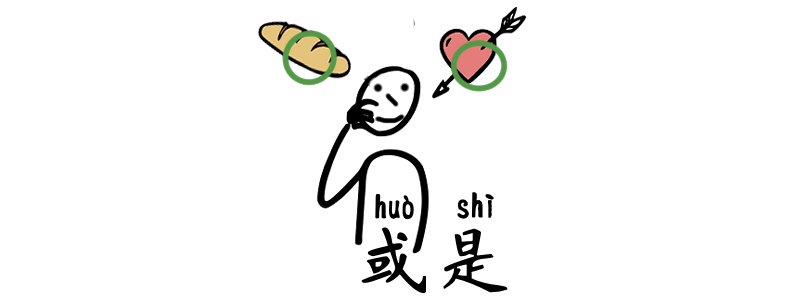Grammar Point:
或者 huòzhě and 或是 huòshì both mean “or” in Chinese, but they are used to express a preference or emphasis on one of the options. It can be translated as “either…or” in English.
Structure
Option 1 + 或者 or 或是 + Option 2
或者 huòzhě is generally considered more formal and literary than 或是 huòshì. It is often used in written or formal contexts, such as news reports, official documents, and academic papers. 或是 huòshì is more colloquial and informal, and is often used in everyday speech.
咖啡或是茶,我都喝咖啡或是茶,我都喝
Either coffee or tea, I drink.
我們週末去看電影或是爬山都好我们周末去看电影或是爬山都好
We can either watch a movie or go hiking on the weekend.
星期六或者星期天一起吃飯吧!星期六或者星期天一起吃饭吧!
Let’s have a meal together on Saturday or Sunday!
想學好中文你應該去台灣或者中國讀書想学好中文你应该去台湾或者中国读书
If you want to learn Chinese well, you should study in Taiwan or China.
如果你沒有牛奶,燕麥奶或是豆漿也OK如果你没有牛奶,燕麦奶或是豆浆也OK
If you do not have milk, either oat milk or soy milk can be ok.
FYI
The word ‘ok’ has become a part of the Chinese culture in Taiwan. We use ‘ok’ as a two-syllable Chinese word, for example, when we ask ‘Are you ok?’ we say ‘你ok吗?’ or ‘你o不ok?’.
我平常在家就是看看韓劇或是日劇我平常在家就是看看韩剧或是日剧
Usually, I watch Korean dramas or Japanese dramas at home.
我去你家或者我們約一家咖啡店,看你怎樣方便我去你家或者我们约一家咖啡店,看你怎样方便
I can go to your place or we can meet at a coffee shop, whichever is more convenient for you.
你加點巧克力或是焦糖會更好吃你加点儿巧克力或是焦糖会更好吃
Adding some chocolate or caramel will make it taste even better.
If you want to use ‘or’ in questions, you need to use 还是 háishì. (HSK 1)


